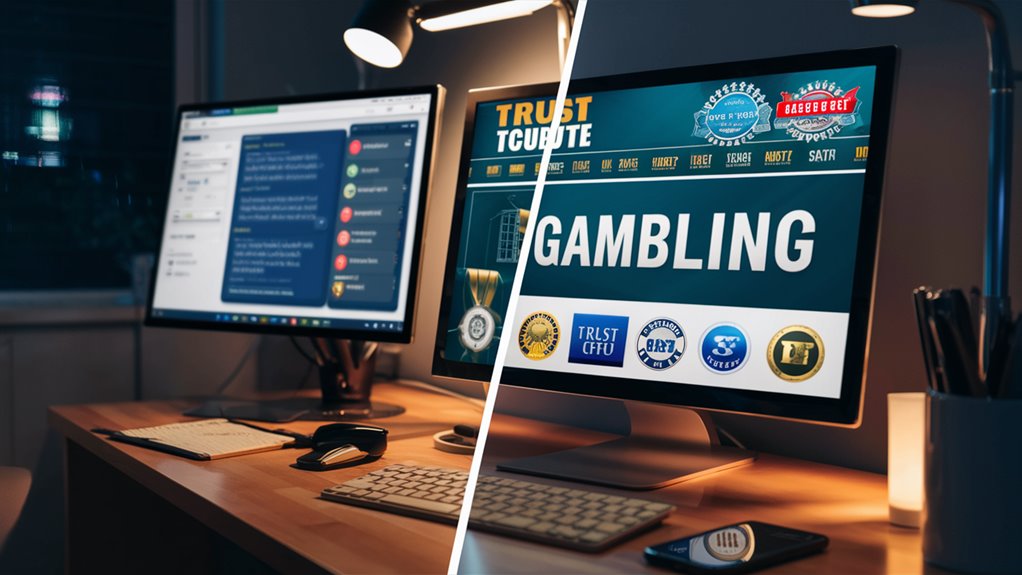How to Pick Top Online Gambling Sites

Ways to Make Sure Your Online Betting is Safe
Finding sites you can trust means looking well at lots of key points. Try these ways to stay safe while you bet.
Licensing and Rules
True licenses from known groups mean the site is real. Look for markings from:
- UK Gambling Commission (UKGC)
- Malta Gaming Authority (MGA)
- Gibraltar Regulatory Authority
- Alderney Gambling Control Commission
Check Their Security Tools
Look for strong safety steps like:
- SSL codes
- Random Number Generator (RNG) proof
- Tests by others
- Rules to keep info safe
How They Handle Cash
See how they deal with money stuff:
- Many pay ways
- Clear pay back times
- Safe ways to trade
- Cash types and swap rates
Is Their Help Good?
See how well they help by:
- Help any time
- Many ways to reach them
- Quick answers
- Help in lots of tongues
What People Say About Them
Find out what folks think by looking at:
- User words
- How they fix stuff
- If they are on a bad list
- Scores from pros
Guide on Online Betting Licensing and Rules
Check If Gaming Licenses are Good
Top licenses from big names are key to a true site. Top bodies include the Malta Gaming Authority, UK Gambling Commission, Gibraltar Regulatory Authority, and Curacao eGaming. These bodies check on fair fun, player safety, and cash safety 토토사이트 먹튀검증
How to Check a License
True sites show their permit details usually down at the end. Main ways are:
- Look at permit numbers on their sites
- Make sure the permit is live
- house advantage below 1%
- See their past
Safe Play and Money Rules
Money Clean Laws
Clean money rules are key. Top sites ask for ID proof for big pays, asking cash back, and showing you are you.
Safe Play Tools
They have proven safe play tools:
- You choose how much you can pay
- Can ask to stop play
- Must take rest times
- Tests on how you are
Are They Really Safe?
Safety in keeping info and fair play come from:
- SSL safe tech
- Regular checks on RNG
- OK by third parties
- Safe money moves
How They Keep Betting Safe Online
Main Safety Ways
The safe base for online betting is about top codes and many-layered safety acts. SSL proof shows as a lock in your browser, the first step for player safety. The lowest safe level is 128-bit code, but the top sites use 256-bit like big banks.
How They Watch Your Account
Two-step sign-in (2FA) adds more than just a password. This key safety act stops bad sign-ins, keeping players safe even if someone else knows their password. Safe pay spots and known pay helpers add to the site’s safety plan.
Game Safety and Fair Play
RNG proof is key for fair play. Groups like eCOGRA and iTech Labs watch RNG plans. They show games are fair and that the site sticks to good play rules. These proofs follow world rules and the best ways.
Top Safety Steps
Top betting sites have real-time wrong act checks, safe data moves, and SSL tech. These top-end safety steps keep your details and cash safe while you play with no problems. True sites check security all the time to fight new online dangers.
How You Can Pay and Pay Speed in Online Betting

Ways to Pay
Betting sites online let you pick from lots of pay ways to match what you like and rules. Usual bank ways like cards and bank wires are common, while online pay ways like PayPal, Skrill, and Neteller make things quick. Cryptocurrency pays are best for secret and fast deals.
Times to Process Pays
Paying in is usually right now with most ways, so you can start playing at once. Getting cash out can change by way:
- E-wallets: 24-48 hours
- Bank wires: 3-5 work days
- Credit cards: 2-4 work days
- Cryptocurrencies: 10 mins to 24 hrs
Safe and Rules
SSL safety tech guards all cash moves, and strict ID checks follow rules and stop bad acts. Sites that stick to the rules have licenses in their spots and use strong acts against dirty money.
Limits and Rules on Pay
Pay limits change by method:
- Least to pay in: $10-50
- Most to pay in: $1,000-50,000
- Limits on cash out: Daily, weekly, or monthly tops
- Limits on how to use: Some ways may be just for paying in or out by place rules
Each way to pay may have set costs for deals and rates for cash swaps, look well before picking.
What Folks Think About Online Betting Sites
Getting the Truth from Reviews
Known review spots like Trustpilot and betting chats give key views on betting sites. Seeing what many say shows clear signs of how true and good the site is. Go for proven words on key things like handling cash, game fairness, and how fast they help.
Signs from Reviews to Watch
Site trust is built on a few basics:
- Speed of cash handling
- How good help is
- How fair games are
- How well they fix fights
- How steady and true the site is
Rules and Licenses
Licensed groups from big places like Malta Gaming Authority, Gibraltar Regulatory Authority, and the UK Gambling Commission are usually more true. Past plays by the rules help a lot when you size up if a betting site is okay.
How to Check Reviews the Right Way
Checking many spots is key when you look at how real an operator is. Focus on:
- How long reviews stay the same
- What they say to bad words
- How fast they fix user fights
- What many platforms say the same
- Proof from outside checks
Signs in Reviews to be Careful With
Watch out for these warning signs:
- Slow times to get cash
- Help not talking
- Odd bonus rules
- Bugs when playing
- Poor handling of fights
Help and How They Fix Problems in Online Betting
Key Ways to Get Help
Help all the time is key for sites with a permit in online betting. All true spots must have lots of ways to talk, like:
- Chat help live
- Email help
- Phone help
- Teams on socials
Is Their Help Good?
Before you put your cash down, see how fast all help ways reply. Good signs are:
- Live chat talks back in 5 mins
- Emails back in 24 hours
- Clear talk in your tongue
- Staff knows their stuff
How They Fix Fights
Good plans to fix fights must be easy to find and clear. Main things are:
- Ways to say you’re mad
- Clear next steps
- Talking with outside help
- Rules from above watching
Standards and Clear Acts
Good fight handling needs:
- Set times to fix fights
- Clear records of fixed cases
- Regular reports to license groups
- Easy to get to fight numbers
- Checks from outside
Checking and Following Rules
Keep an eye on how true they are through:
- Checks in rule books
- Watching industry acts
- Records of past fights
- Papers showing they follow rules
- Reports from outside checks


